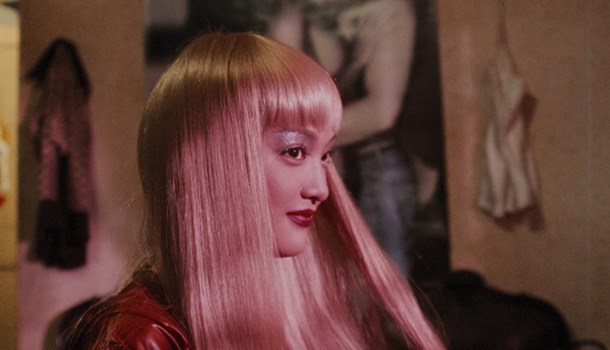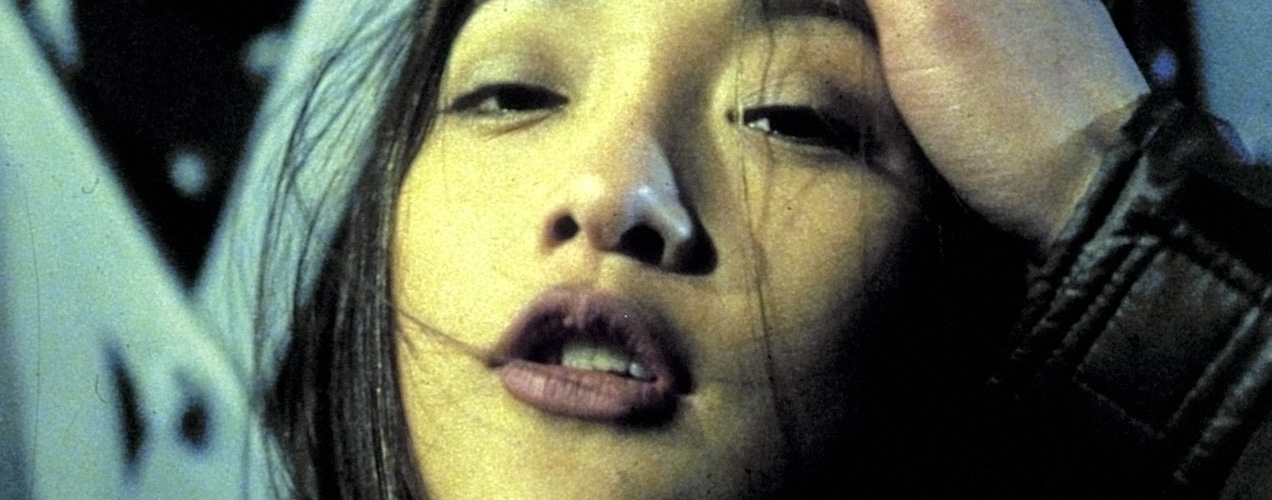
Written by Richard Durrance on 26 Apr 2024
Distributor Radiance • Certificate 15 • Price £17.99
Unusually, we are moving away from Japanese cinema and bobbing into Chinese for the next Radiance offering: Suzhou River (2000). The title seemed familiar – had I seen this before? Maybe I had back when the film was released at the beginning of the millennium but if so no memory of its content lingered. So, a good way to ease into Lou Ye’s film that had drawn comparisons with the films of Wong Kar-wai and Hitchcock’s Vertigo.
A nameless Videographer (Zhang Ming Fong) floats down the Suzhou river, filming moments as he awaits calls on his pager for work. One day he rolls in to see a client, who wants him to film the mermaid in his bar, Meimei (Zhou Xun). Mutual attraction strikes and Meimei drifts through his life, but leaves him with a question: would the Videographer look for her all his life like Mardar?
Who is Mardar? Does he even exist? No idea, so the Videographer begins to invent the story of a motorcycle courier, Mardar (Jia Hongsheng), who becomes involved with a young woman, Moudan (Zhou Xun, again), and the lives of the Videographer and Mardar start to intertwine...
The moment you understand that the film riffs off Vertigo means that it’s no surprise that Meimei and Moudan will be played by the same actor and might even be the same woman. This could not be more assumed. Not that this is a problem, as this is arguably a film just as much about mood, style, time and place as it is about character. Set in that kind of industrial Shanghai that's at odds with any glossy modern interpretation, people will likely live in dingy apartments, buildings will be hollowed out, and bars are rough around the edges (more so for seeming to serve only Budweiser - no one should have to drink that most awful peasant of beers). The film’s opening, with its jump cuts and Videographer’s voiceover (that powers much of the film) grounds events in their grimy setting, the flowing handheld camera work lending the film much of its style. The jump cuts create a feel of cinematic non-sequitor, and this is shown at its best and most brilliantly when our Videographer is being told by an almost incoherent client about his assignment to film Meimei. This comes across both visually and viscerally, through the film’s superb editing. It’s a virtuoso moment of cinema, and the film at its very best.
The opening has an intimacy that entices further viewing, once again channeling the spirit of Hitchcock in how everything is seen via the Videographer’s lens. This framing perhaps encourages the audience to consider the voyeuristic nature of cinema, as our narrator films the beginning of his relationship with Meimei.
Then, as the film pivots to tell the Videographer’s imaginary story of Mardar and Moudan, he takes a step back. Yet we remain in the same slightly seedy, forgotten industrial corners of the city. There is a visual consistency and as an audience even without the Vertigo reference we can understand where the film is going. However this is also the cause of the feature's main problems, keeping you at arms length means that you're never allowed into the lives of the players - while the film continues to be visually intriguing, it's hard to connect all that much with the characters, and certainly I found myself disconnected emotionally.
This is ironic considering most of the characters essentially suffer from being obsessive, often apparently one-sidedly, about the object of their affections. As Mardar searches for Moudan, as the Videographer misses Meimei, I wanted to care more about them but found it hard to be invested – I suspect it doesn’t help that the Videographer acts more as a framing device than as a character. Subsequently, it is much of what occurs around our protagonists that is most interesting such as the woman Mardar is entangled with criminally or the side characters who populate this down at heels Shanghai, though often we only glimpse them. This is despite Zhou Xun being admittedly excellent in her dual roles, playing each character with distinction and distinctly; the schoolgirls innocence and desire to transgress in Moudan and the mature, seen-it-all Meimei. Even though she is often dressed in a similar colour of green dress to that of Kim Novak’s in Vertigo this never distracts or detracts from what is a skilled piece of acting doubling as inhabitation of a character.
If the Vertigo comparisons thematically aren't enough, the music is often redolent of Bernard Herrmann’s lush strings too, but unlike the great Vertigo imitator Brian De Palma, where De Palma is willing to go full-on in his retellings of the same story, here it feels bit more of a device; I think maybe the way Suzhou River never willingly does the same works against it; either that or throw out the Vertigo story and the multiple framing devices that go with it (which I think is one of the big reasons the film struggles to resonate emotionally) and instead explore Shanghai in its transitional and its underworldly aspects, wherein you’d think its style and performances would have gained more traction.
Don’t get me wrong, this is still in most ways a very good film, but it's lack of emotional engagement is a problem. I can however see why it would totally float the boat (pun intended) of many, and it has genuine flashes of brilliance. Also, I realise 20-25 years ago, In the Mood for Love aside, I had the same reaction to Wong Kar-wai's work – I could appreciate the style but his films felt a bit hollow to me (I need to revisit them I admit and might see them differently now), but Suzhou River would definitely connect to those who love Wong Kar-wai's work and I suspect they might rhapsodise about this film after seeing it. Certainly moments are superb, the use of cinema to evoke a subjective feeling such as the ramblingly incoherent client that hires the Videographer is genuinely one of the best scenes you could hope to witness.
Suzhou River as an image of city and society in transition is often excellent in its side-eyed view of change, the casual corruption, illegality, tenuous relationships and slow evolution into a new world is often exciting. I just wish I felt it more.


Long-time anime dilettante and general lover of cinema. Obsessive re-watcher of 'stuff'. Has issues with dubs. Will go off on tangents about other things that no one else cares about but is sadly passionate about. (Also, parentheses come as standard.) Looks curiously like Jo Shishido, hamster cheeks and all.
posted by Ross Locksley on 01 May 2024
posted by Richard Durrance on 18 Apr 2024
posted by Richard Durrance on 11 Apr 2024
posted by Dan Barnett on 04 Apr 2024
posted by Richard Durrance on 28 Mar 2024
posted by Richard Durrance on 26 Mar 2024
posted by Richard Durrance on 20 Mar 2024
posted by Richard Durrance on 11 Mar 2024